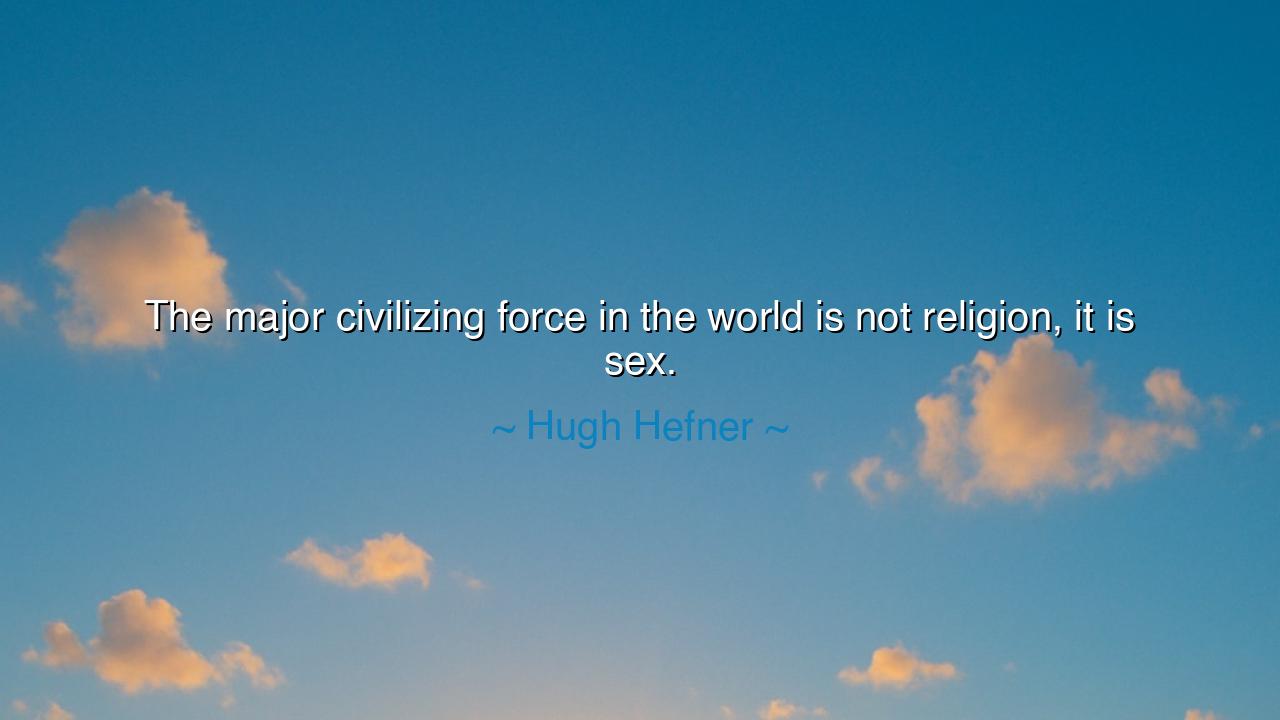
The major civilizing force in the world is not religion, it is






In the vast history of human civilization, certain forces have shaped societies, values, and cultural structures. One such force, often relegated to the private realm, is the primal energy of sex. Hugh Hefner, the founder of Playboy, made a provocative assertion that challenges conventional thought when he stated, “The major civilizing force in the world is not religion, it is sex.” These words ring with a deep complexity, for Hefner does not dismiss the importance of religion, but rather places sex as the catalyst for a profound transformation in human culture, liberation, and expression. It is a force so integral to our lives that it transcends merely biological functions, shaping societal norms, cultural expressions, and even moral codes.
Sex, in its most fundamental sense, has been a central force in the human experience since the dawn of time. In ancient cultures, it was celebrated and revered, symbolizing the creative power that gave birth to life itself. The ancient Greeks, with their pantheon of gods and goddesses, often saw love and sexuality as divine forces, not only responsible for reproduction but for creating and maintaining the cosmic order. The act of sex, in this view, was not merely an act of pleasure but one of sacred union, fostering balance and connection in the universe. Similarly, in ancient India, the Kamasutra was not just a manual on love and sex but a guide to understanding the role of human desire within the framework of dharma (duty), artha (prosperity), and moksha (liberation), showing how sex could harmonize with the pursuit of higher values.
Yet, Hefner’s words strike a deeper chord—sex has evolved beyond its mere biological and cultural significance. It has become, in the modern era, a symbol of freedom, individual expression, and liberation. Consider the story of the sexual revolution in the 1960s, which saw the liberation of sexual norms in the Western world. People, particularly women, began to break free from the shackles of puritanical values that had defined their roles for centuries. Hefner, through his creation of Playboy, was both a product and a pioneer of this transformation, promoting a new vision of sexual freedom and personal empowerment. The Playboy philosophy, which embraced the celebration of sex as a form of liberation and self-expression, was, in many ways, a response to the repressive moral codes of the time.
The implications of Hefner’s statement are profound, for it suggests that sex, when seen as a force for human connection, pleasure, and freedom, holds the power to transform society in ways that religion often does not. Religion, for all its nobility and spiritual guidance, can sometimes become a tool of control, enforcing rigid structures and moral codes that may stifle personal freedom and expression. However, sex, in its most liberated and consensual form, has the ability to unite individuals across societal boundaries, to break down barriers of class, race, and even gender, by focusing on the shared humanity that underpins human desire. The sexual revolution is a testament to this, a movement that, while not without its challenges and contradictions, showed how sex can serve as a catalyst for social change and individual empowerment.
It is also important to recognize that the sexual liberation Hefner championed was not without controversy. It raised difficult questions about the commodification of intimacy, the objectification of women, and the consequences of a sexually liberated society. Yet, even amidst these criticisms, Hefner’s statement holds a truth: the very act of embracing and celebrating sex has a unique power to challenge long-standing moral structures. Just as religion has shaped societal norms, sex—when liberated and consensually embraced—becomes a vehicle for personal freedom, cultural expression, and social evolution. It is a force that brings people together, fostering relationships, understanding, and, at its best, mutual respect.
The lesson in Hefner’s words is not merely about celebrating sex, but about recognizing its transformative power in our personal and collective lives. Sex is more than a physical act; it is a force of connection, capable of breaking down barriers and building new forms of community. It reminds us of the human need for expression, freedom, and connection, and how these elements are often at odds with rigid societal norms. In our own lives, we must learn to embrace the power of sex—not as a commodity, but as a means of personal expression, intimacy, and freedom. We must also recognize its potential for growth, and connection, while respecting the boundaries and needs of others.
In doing so, we may find that sex, when treated with respect and understanding, can indeed serve as a catalyst for social change and personal liberation—a driving force that empowers individuals to live authentically and to embrace the interconnectedness of all people. Whether through the sexual revolution or the quiet exploration of one’s own identity and desires, Hefner’s words call us to celebrate the liberating power of sexuality while also recognizing the responsibility that comes with it. For in this recognition, we find not just individual freedom, but a deeper, shared humanity, bound by love, desire, and connection.






AAdministratorAdministrator
Welcome, honored guests. Please leave a comment, we will respond soon